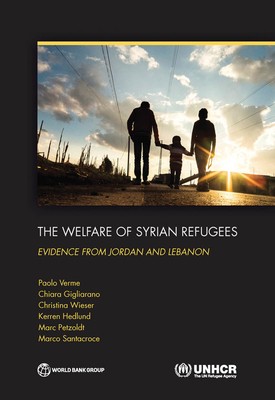
- We will send in 10–14 business days.
- Author: Paolo Verme
- Publisher: World Bank Publications
- Year: 2015
- Pages: 194
- ISBN-10: 1464807701
- ISBN-13: 9781464807701
- Format: 17.8 x 25.4 x 1.1 cm, softcover
- Language: English
- SAVE -10% with code: EXTRA
Reviews
Description
The Syrian refugee crisis, which began in 2011, is one of the most pressing disasters in the world today, with its effects reverberating around the globe. By the end of 2015, more than 7.6 million of the country's people had been internally displaced and 4.3 million were registered refugees. The number of internally displaced persons and refugees amounts to about half of Syria's precrisis population. Thousands have died while trying to reach safety. Due to the large humanitarian response, there is now a wealth of available information on refugees' income and expenses, food and nutrition, health, education, employment, vulnerability, housing, and other measures of well-being. These data have been little explored, as humanitarian organizations face daily challenges that make the full use of existing data very difficult. The Welfare of Syrian Refugees: Evidence from Jordan and Lebanon aims to assess the poverty and vulnerability of these refugees and evaluate existing and alternative policies designed to help them. The authors find that current policies, including cash transfers and food vouchers, are effective in reducing poverty, but fail to lead to-- nor are they designed to yield--economic inclusion and self-reliance. Those goals would require a different humanitarian and development paradigm, one that focuses on growth policies for areas affected by refugees where the target population has a mix of refugees and hosting populations. This volume is the result of the first comprehensive collaboration between the World Bank Group and the United Nations High Commissioner for Refugees (UNHCR) and aims to better understand and ultimately improve the well-being of Syrian refugees living in Jordan and Lebanon.
EXTRA 10 % discount with code: EXTRA
The promotion ends in 20d.09:30:11
The discount code is valid when purchasing from 10 €. Discounts do not stack.
- Author: Paolo Verme
- Publisher: World Bank Publications
- Year: 2015
- Pages: 194
- ISBN-10: 1464807701
- ISBN-13: 9781464807701
- Format: 17.8 x 25.4 x 1.1 cm, softcover
- Language: English English
The Syrian refugee crisis, which began in 2011, is one of the most pressing disasters in the world today, with its effects reverberating around the globe. By the end of 2015, more than 7.6 million of the country's people had been internally displaced and 4.3 million were registered refugees. The number of internally displaced persons and refugees amounts to about half of Syria's precrisis population. Thousands have died while trying to reach safety. Due to the large humanitarian response, there is now a wealth of available information on refugees' income and expenses, food and nutrition, health, education, employment, vulnerability, housing, and other measures of well-being. These data have been little explored, as humanitarian organizations face daily challenges that make the full use of existing data very difficult. The Welfare of Syrian Refugees: Evidence from Jordan and Lebanon aims to assess the poverty and vulnerability of these refugees and evaluate existing and alternative policies designed to help them. The authors find that current policies, including cash transfers and food vouchers, are effective in reducing poverty, but fail to lead to-- nor are they designed to yield--economic inclusion and self-reliance. Those goals would require a different humanitarian and development paradigm, one that focuses on growth policies for areas affected by refugees where the target population has a mix of refugees and hosting populations. This volume is the result of the first comprehensive collaboration between the World Bank Group and the United Nations High Commissioner for Refugees (UNHCR) and aims to better understand and ultimately improve the well-being of Syrian refugees living in Jordan and Lebanon.


Reviews